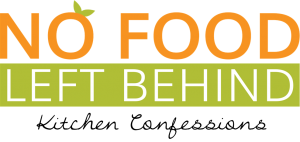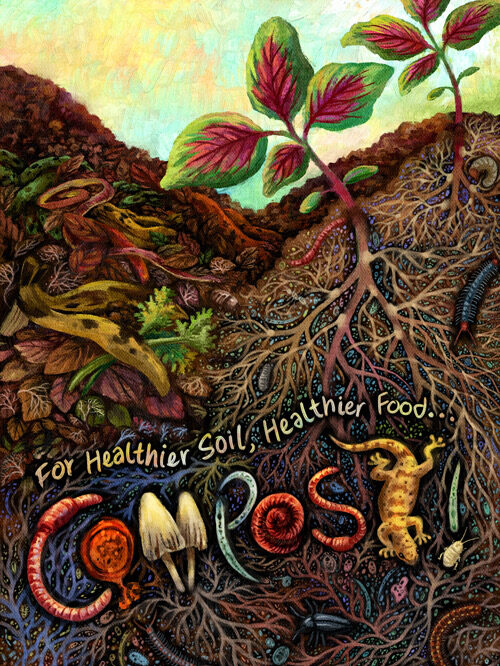Greetings, Conscientious Food Consumers!
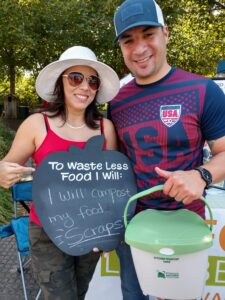
Ever since No Food Left Behind-Corvallis began its public outreach at our local farmers’ markets, we’ve noticed how people love to talk about composting! Of course, there’s personal satisfaction in turning food scraps into enrichment and/or worm castings for one’s home garden. It can be fun to experiment with various DIY approaches to composting in your backyard, your neighborhood or community garden, or maybe just with a few containers outside at your apartment.
Compost, done properly, does provide an important boost to soil quality and plant health, as well as for the insects and microorganisms needed for thriving gardens. It also helps retain moisture in the soil and reduces the need for pesticides or chemical fertilizers.
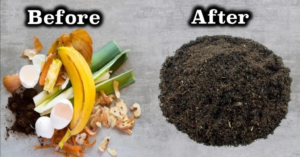
And since throwaway food comprises almost one-quarter of the organic waste going into municipal landfills, composting also serves an important function for diverting that waste stream, sequestering carbon and reducing the generation of the powerful, climate-altering greenhouse gas, methane. The US Compost Council’s theme for its 2024 International Compost Awareness Week is “nature’s climate champion.”
So, of course, we love composting too! We’re always happy to send folks home with a nifty kitchen compost bucket, stuffed with some of our Smart Strategies for wasting less food at home, and saving your grocery $$, every day.
But for many folks, composting is a feel-good antidote for food waste guilt, and a way to excuse our not-so-diligent efforts to reduce the amount of EDIBLE food going into that kitchen compost bucket, the backyard compost pile, and/or the Yard Debris (“Mixed Organics”) cart from Republic Services.*
Let’s be clear, Conscientious Consumers: composting happens at the END of the food that we buy, store, prep and discard… right?
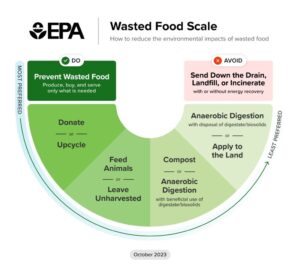
If something that was edible to begin with ends up in the compost pile (or worse, the garbage), it was still wasted! It’s a waste of all the water, energy, labor — and your $$$– that went into getting that food from farm to fork. For the average American family of four, wasted food adds up $1,600 a year! How much could you save by COMPOSTING LESS?
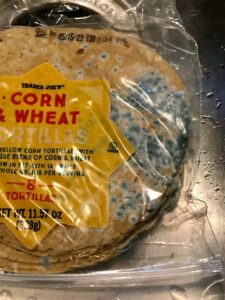
K’RENE’S CONFESSION: As it turns out, we can save more and compost less at my house, too! We followed the advice in COMPOST LESSon #2 (below) but still managed to deliver a whole package of tortillas into the compost.
There was cod in the freezer, red cabbage and cilantro fresh from the garden, and other ingredients already on hand, so we planned a meal of fish tacos. Unhappily, while rummaging in the cheese drawer for the pepper-jack shreds, I discovered a entire unopened package of moldy tortillas! Apparently, they had been taken out of the freezer, placed in the drawer, and buried before they had thawed completely. Predictably, melting remnants of frozen crystals inside the sealed package provided a nice medium for a happy colony of microbes — and off to the store we went for fresh tortillas. MONEY WASTED: $3.99
LESSON LEARNED: StillTasty.com advises us to wrap tortilla package (unopened) in foil or plastic, or use a freezer bag, to avoid ice crystals. And next time, we’ll thaw the tortillas on the fridge shelf in plain sight!
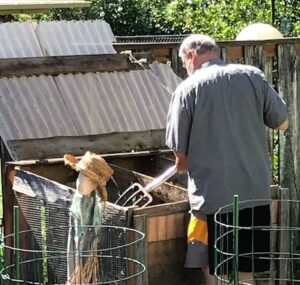
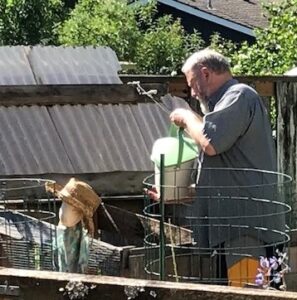
COMPOST LESSon #1: Just how much food DO you compost in one week that was formerly-edible? We challenge you to an at-home wasted food audit for a reality check! If you’re a no-waste champ, please share what you know with people who need to learn those skills.
COMPOST LESSon #2: Shop your fridge-freezer-pantry first! Then meal-plan and do a shopping list, using helpful resources like this one from our local Co-op . Repeat until it becomes a comfortable money-saving habit.
COMPOST LESSon #3: Share surplus food with friends, neighbors, other people, or animals (urban dwellers, think chickens and rabbits) before it becomes compost! Check with Linn-Benton Food Share or your local food pantries in Philomath and Corvallis for donation guidelines and drop-off hours. The South Corvallis Food Bank welcomes your fresh garden produce.
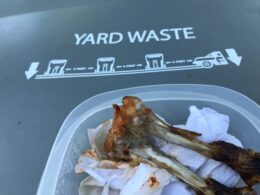 * DID YOU KNOW? In your Republic Services yard debris cart, you can chuck the yucky spoiled meat, seafood, dairy and bones that don’t belong in your own compost heap. If you don’t have your own Yard Debris cart, ask a neighbor or friend who does. Republic’s organics processing facility near Adair Village — established in 2010 as the first such facility in Oregon — can handle it.
* DID YOU KNOW? In your Republic Services yard debris cart, you can chuck the yucky spoiled meat, seafood, dairy and bones that don’t belong in your own compost heap. If you don’t have your own Yard Debris cart, ask a neighbor or friend who does. Republic’s organics processing facility near Adair Village — established in 2010 as the first such facility in Oregon — can handle it.
Remember, we love composting! The challenge is to compost LESS.
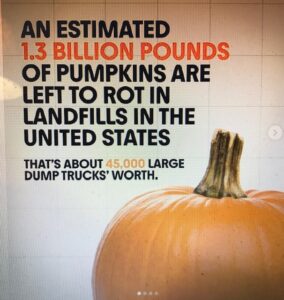 PLEASE DO COMPOST: HALLOWEEN PUMPKINS!
PLEASE DO COMPOST: HALLOWEEN PUMPKINS!
Just be sure to make use of those tasty “pumpkin guts” first!
If you want a compost pail like the one above, you can get one by visiting the NFLB table at our local Farmers’ Markets, periodically on Saturdays (downtown), Tuesdays (south town) and Sundays (Philomath). You can also play our new Wasted Food Prevention Bingo, where EVERYONE WINS! We’ll also be at the Winter Market at the Benton County Fairgrounds, starting in January.
You can also request one by emailing us at [email protected].
